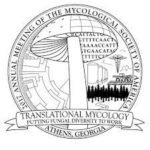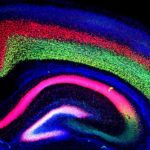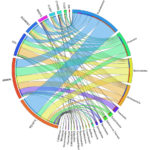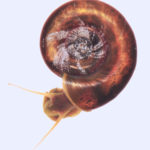N. Louise Glass, director of the Environmental Genomics and Systems Biology Division, is being named a fellow of the Mycological Society of America (MSA) at their annual meeting being held this week in Athens, GA. MSA Fellows recognize mid-career members and also MSA volunteers. Glass is being honored as an outstanding mycologist who has served the MSA in several capacities, including as a member of both the Society’s leadership body and the Editorial Board of Mycologia, the official journal of the MSA. Read more in the MSA meeting announcement.
Researchers Collaborate to Create, Characterize Mouse Model of Autism
Using a genetic mouse model developed at Berkeley Lab with CRISPR/Cas9 editing technology, University of California, Davis, researchers led by Alexander Nord have examined the developmental impact of a specific mutation found in some rare cases of autism spectrum disorder (ASD). The project began while Nord—now an assistant professor with the Center for Neuroscience at UC Davis—was a postdoc in the Mammalian Functional Genomics Laboratory of Berkeley Lab co-authors Axel Visel, Len Pennacchio, and Diane Dickel. In a paper published June 26 in the journal Nature Neuroscience, the researchers report that mice with a loss-of-function mutation in one copy of the CHD8 gene have increased brain volume and cognitive impairment, similar to that seen in people with the same mutation. CHD8 encodes a protein responsible for packaging DNA in cells, which in turn controls gene expression during development. Read more from UC Davis.
JGI Researchers Release 1000+ Microbial Reference Genomes
Department of Energy Joint Genome Institute (DOE JGI) and Biosciences Environmental Genomics and Systems Biology (EGSB) division researchers have released 1,003 reference genomes for diverse bacteria and archea isolated from environments ranging from sea water and soil, to plants, and to cow rumen and termite guts. The release is the largest to date from JGI’s Genomic Encyclopedia of Bacteria and Archaea (GEBA) initiative, which seeks to fill in unexplored branches of the tree of microbial life. JGI’s Supratim Mukherjee and Rekha Seshadri were co-first authors on the paper published in Nature Biotechnology; senior author Nikos Kyrpides and co-authors Natalia Ivanova, Axel Visel, Tanja Woyke, and Yasuo Yoshikuni have secondary affiliations with EGSB. The genomes are publicly available through the Integrated Microbial Genomes with Microbiomes (IMG/M) system. Read more on the JGI website.
JBEI’s Vy Ngo Awarded Grace Fimognari Memorial Prize
 Vy Ngo, student assistant with JBEI ’s Feedstocks Division, part of the Biological Systems and Engineering (BSE) Division was awarded the Grace Fimognari Memorial Prize during UC Berkeley’s Molecular & Cell Biology (MCB) 2017 Commencement. The Prize established in 1969 is awarded to outstanding graduating senior in the Biochemistry and Molecular Biology (BMB) emphasis of the MCB major. Ngo was mentored by Jenny Mortimer, JBEI’s Director of Plant Systems Biology, initially through Berkeley Lab’s Community College Internship (CCI) program in 2015 and then completed the Science Undergraduate Laboratory Internship (SULI) program in 2016. She continued to intern at JBEI as she transitioned to UC Berkeley.
Vy Ngo, student assistant with JBEI ’s Feedstocks Division, part of the Biological Systems and Engineering (BSE) Division was awarded the Grace Fimognari Memorial Prize during UC Berkeley’s Molecular & Cell Biology (MCB) 2017 Commencement. The Prize established in 1969 is awarded to outstanding graduating senior in the Biochemistry and Molecular Biology (BMB) emphasis of the MCB major. Ngo was mentored by Jenny Mortimer, JBEI’s Director of Plant Systems Biology, initially through Berkeley Lab’s Community College Internship (CCI) program in 2015 and then completed the Science Undergraduate Laboratory Internship (SULI) program in 2016. She continued to intern at JBEI as she transitioned to UC Berkeley.
Scientists Sequence Genome of Snail That Spreads Parasitic Worm
An international team of scientists, including Environmental Genomics & System Biology Division’s Monica Munoz-Torres, has characterized the genome of B. glabrata, a freshwater snail that is instrumental in transmitting a parasitic worm to humans. The achievement could help researchers disrupt the life cycle of the worm that causes the disease schistosomiasis, an also known as snail fever. Read the science short at the Berkeley Lab News Center.
- « Previous Page
- 1
- …
- 35
- 36
- 37
- 38
- 39
- …
- 47
- Next Page »
Was this page useful?







